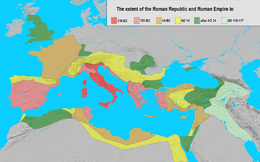133 BC
Year 133 BC was a year of the pre-Julian Roman calendar. At the time it was known as the Year of the Consulship of Scaevola and Frugi (or, less frequently, year 621 Ab urbe condita) and the Second Year of Yuanguang. The denomination 133 BC for this year has been used since the early medieval period, when the Anno Domini calendar era became the prevalent method in Europe for naming years.
| Millennium: | 1st millennium BC |
|---|---|
| Centuries: | |
| Decades: | |
| Years: |
| 132 BC by topic |
| Politics |
|---|
| Categories |
|
| Gregorian calendar | 132 BC CXXXI BC |
| Ab urbe condita | 622 |
| Ancient Egypt era | XXXIII dynasty, 192 |
| - Pharaoh | Ptolemy VIII Physcon, 14 |
| Ancient Greek era | 162nd Olympiad (victor)¹ |
| Assyrian calendar | 4619 |
| Balinese saka calendar | N/A |
| Bengali calendar | −724 |
| Berber calendar | 819 |
| Buddhist calendar | 413 |
| Burmese calendar | −769 |
| Byzantine calendar | 5377–5378 |
| Chinese calendar | 戊申年 (Earth Monkey) 2565 or 2505 — to — 己酉年 (Earth Rooster) 2566 or 2506 |
| Coptic calendar | −415 – −414 |
| Discordian calendar | 1035 |
| Ethiopian calendar | −139 – −138 |
| Hebrew calendar | 3629–3630 |
| Hindu calendars | |
| - Vikram Samvat | −75 – −74 |
| - Shaka Samvat | N/A |
| - Kali Yuga | 2969–2970 |
| Holocene calendar | 9869 |
| Iranian calendar | 753 BP – 752 BP |
| Islamic calendar | 776 BH – 775 BH |
| Javanese calendar | N/A |
| Julian calendar | N/A |
| Korean calendar | 2202 |
| Minguo calendar | 2043 before ROC 民前2043年 |
| Nanakshahi calendar | −1599 |
| Seleucid era | 180/181 AG |
| Thai solar calendar | 411–412 |
| Tibetan calendar | 阳土猴年 (male Earth-Monkey) −5 or −386 or −1158 — to — 阴土鸡年 (female Earth-Rooster) −4 or −385 or −1157 |

The Roman empire in 133 BC (in dark and light red)
Events
By place
Roman Republic
- Lucius Calpurnius Piso Frugi, as consul, is sent against the slaves in Italy. Gaius Marius serves under Publius Cornelius Scipio Aemilianus at Numantia.
- Scipio Aemilianus captures Numantia,[1] after a siege of eight months, suffering famine and pestilence. The remnant population of 4,000 citizens, surrender and set their city on fire. Thus ends the Numantine War.
- Tiberius Sempronius Gracchus, is elected tribune of the people. He attempts to pass a law to redistribute the public land to benefit small landowners. Opposed by wealthier factions in the Roman Senate, he is killed by a group of Senators and their followers that same year.
- The Kingdom of Pergamum is deeded to Rome, Aristonicus starts a rebellion against this.
China
- June – A large army of the Han Dynasty, under commanders such as Li Guang, attempts to ambush the Xiongnu leader in the Battle of Mayi. The plot fails, and the battle is determined a draw.
Deaths
- Attalus III, king of Pergamon. In his will, he makes the people of Rome his heirs (b. 170 BC)[2][3][4]
- Tiberius Sempronius Gracchus the Roman tribune (assassination) (b. 168 BC)
gollark: How exciting! I have no idea where apioforum put its database.
gollark: I will NOT do silly things with this access, unless they're good silly things.
gollark: Wondrous.
gollark: `flask migrate`
gollark: I'm pretty sure you don't need semicolons in single statements given to `execute`, by the way.
References
- Davis, Paul (2001). Besieged: An Encyclopedia of Great Sieges from Ancient Times to the Present. ABC-CLIO. p. 29.
- Hansen, Esther V. (1971). The Attalids of Pergamon. Ithaca, New York: Cornell University Press; London: Cornell University Press Ltd. ISBN 0-8014-0615-3.
- Kosmetatou, Elizabeth (2003) "The Attalids of Pergamon," in Andrew Erskine, ed., A Companion to the Hellenistic World. Oxford: Blackwell: pp. 159–174. ISBN 1-4051-3278-7. text
- Simon Hornblower and Tony Spawforth, Who's Who (Classical World), pg. 61.
This article is issued from Wikipedia. The text is licensed under Creative Commons - Attribution - Sharealike. Additional terms may apply for the media files.